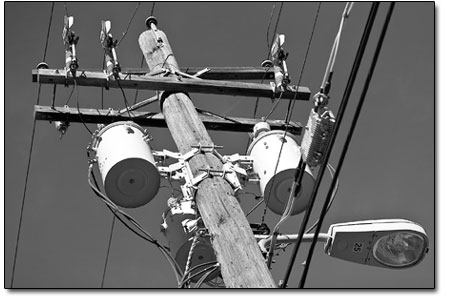|
| ||
| The cost of coal
by Will Sands Local residents may be taking coal-fired power in the pocketbook as well as the lungs. A recently released report is openly critical of La Plata County’s power supplier and its reliance on the dated fossil fuel. It goes on to cite a serious financial cost of continuing to pursue the “dinosaur” technology. Tri-State Generation and Transmission supplies electricity to 44 member-coops in Colorado, New Mexico, Nebraska and Wyoming. Durango’s La Plata Electric Association is among them. As the dominant supplier for rural Colorado, the utility has long maintained a low-rate approach to producing power. To date, that approach has resulted in a heavy reliance on coal and yesterday’s technological advances. Approximately 75 percent of Tri-State’s Colorado electricity comes from coal, and the utility has been accused of taking a casual approach on developing renewable sources of power. Tri-State’s philosophy is perhaps most evident in the company’s quest to built a 700-megawatt coal-fired power plant near Holcomb, Kan. Last October, the Kansas Department of Health and Environment rejected Tri-State’s bid for the plant, saying the additional greenhouse gas emissions present a “substantial endangerment” to that state’s public health. Undeterred, Tri-State continues to push for new coal-fired power plants to meet growing demand, including a proposed plant in southeastern Colorado. In Kansas the company is pursuing legal and legislative means to overturn the denial and build the Holcomb plant despite objections. But beyond arguments against additional greenhouse gas generation, a new study may have also poked a hole in Tri-State’s foundation – cheap power. An analysis commissioned by the Natural Resources Defense Council alleges that continuing to pursue coal-fired power will come at a high cost for Tri-State, and those costs are likely to be borne by ratepayers in Durango and beyond. Innovest Strategic Value Advisors completed and released the report last week. At the heart of the study is the fact that global energy markets are transitioning to a carbon-constrained world. Eric Kane, the report’s author and a senior research analyst at Innovest, noted that hefty taxes on carbon emissions will be a certainty under the Obama Administration. “High electricity rates are likely if the company continues to pursue its reliance on coal,” Kane said. “Tri-State appears to be ignoring coming regulations and trends that are shifting from coal-fired power to more renewable energy resources.” Kane noted that the trend is particularly disturbing given the abundant renewable resources of Tri-State’s service area, where ample opportunities exist for wind and solar power generation. He added that Tri-State is virtually alone4 among utilities in its adherence to carbon-based power. “Coal-fired power expansion remains the focal point of Tri-State’s resource planning,” Kane said. Theo Spencer, of the Natural Resources Defense Council, commented that the Nov. 4 election marked a sea-change in national power generation. He noted that a federal cap on carbon dioxide emissions is imminent and will be stringent, cutting 80 percent of U.S. greenhouse gas emissions by 2050. “That doesn’t bode well for utilities that rely heavily on coal,” Spencer said. “The writing is very clearly on the wall. Things are going to be done to regulate emissions, and the president-elect sees this as an economic opportunity.” Spencer concluded that the era of new coal-fired power plants is rapidly drawing to a close. In the last week alone, Wisconsin regulators shut down plans for a $1.3 billion plant. Just days later, the EPA’s Environmental Appeals Board blocked Deseret Electric Power Cooperative’s plans for a new plant in east Utah (see sidebar). Beyond regulation, financing for new power plants is drying up, according to Spencer. “In recent years, there were 150 coal-fired power plants proposed in various parts of the nation,” Spencer said. “At least half of those plans have been cancelled due to legal challenges and financial difficulties.” Local cooperative members and ratepayers should be concerned about their indirect reliance on coal, argued Josh Joswick, energy issues coordinator for San Juan Citizens Alliance. Any call for change must start at the grassroots and move up through La Plata Electric Association, he added. “It’s really going to be up to us to influence LPEA to influence Tri-State,” Joswick said. “Getting change will require some serious effort on the part of local ratepayers.” And as for that change, Joswick argued that individuals, cooperatives and utility companies all have to start thinking beyond coal-fired power generation. “If you look at the whole cycle of coal – from mining to transportation to combustion – it is really such a dinosaur technology,” he said. “If people are still looking at coal as a bright future, we’re all in serious trouble.” •
|
In this week's issue...
- December 18, 2025
- Let it snow
Although ski areas across the West have taken a hit, there’s still hope
- December 18, 2025
- Look, but don't take
Lessons in pottery theft – and remorse – from SW Colorado
- December 11, 2025
- Big plans
Whole Foods, 270 apartments could be coming to Durango Mall parcel


